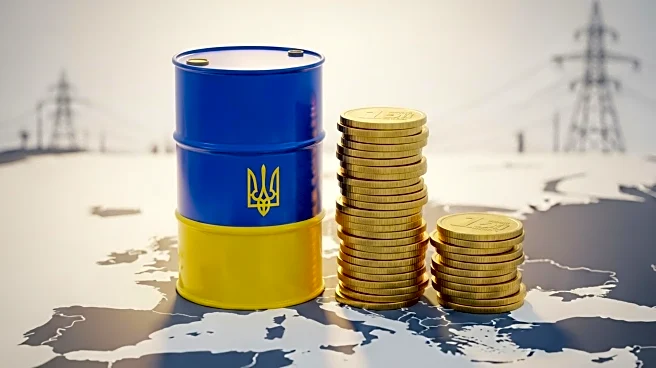What's Happening?
Ukraine is actively encouraging European nations to cease purchasing Russian oil and instead buy American oil, offering storage space for US energy firms to facilitate this transition. Ukrainian President Volodymyr Zelensky's top adviser, Andriy Yermak, emphasized the mutual benefits of widespread Russian oil sanctions for Ukraine, the US, and Europe. President Trump has been advocating for these sanctions, aiming to weaken Russia's financial support for its military actions in Ukraine. The sanctions would also economically benefit the US by increasing its oil exports to Europe. Ukraine is prepared to collaborate with the US energy sector, leveraging its capacity to store and transport liquified natural gas to Europe, filling the void left by Russian oil. Recent discussions between Ukrainian and European leaders, including Slovakia, indicate a willingness to explore alternatives to Russian energy, although formal commitments have yet to be made.
Why It's Important?
The push for sanctions on Russian oil is significant as it represents a strategic effort to undermine Russia's ability to finance its military operations in Ukraine. By encouraging European nations to switch to American oil, the US stands to gain economically, potentially increasing its influence in the global energy market. This move could also strengthen the geopolitical alliance between the US, Ukraine, and European countries against Russian aggression. The sanctions could impact major Russian oil purchasers like China and India, altering global energy dynamics. Additionally, the initiative aligns with President Trump's 'America First' policy, promoting US interests abroad while supporting Ukraine's defense against Russian advances.
What's Next?
Ukraine and the US are expected to continue diplomatic efforts to persuade European countries to adopt the proposed sanctions. President Trump has indicated readiness to proceed with 'phase two' of the sanctions, following Russia's recent large-scale attack on Ukraine. The success of these efforts will depend on the willingness of European nations to reduce their reliance on Russian energy and the ability of the US to provide viable alternatives. Further discussions between President Trump and Russian President Vladimir Putin may influence the implementation of these sanctions.
Beyond the Headlines
The proposed sanctions could have broader implications for international relations and energy security. They may prompt European countries to accelerate their transition to renewable energy sources, reducing dependency on foreign oil. The initiative also highlights the complex interplay between economic interests and geopolitical strategies, as nations navigate the challenges of energy independence and security. The potential shift in energy alliances could reshape global power dynamics, with long-term effects on international trade and diplomacy.









